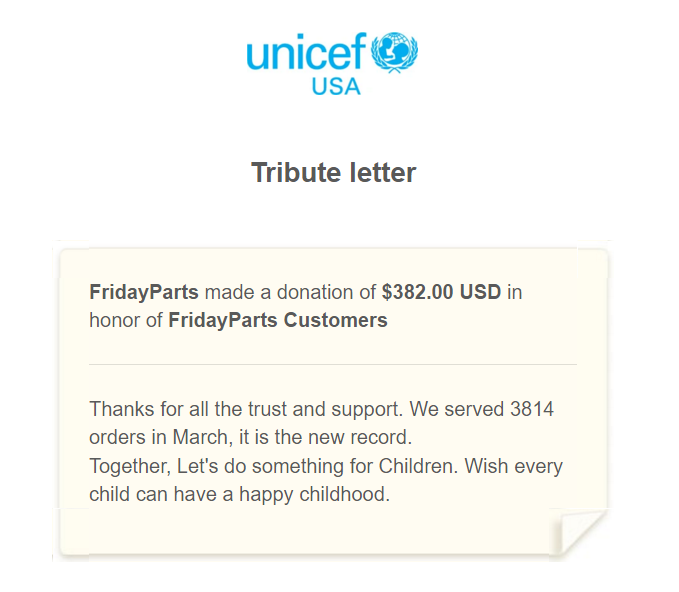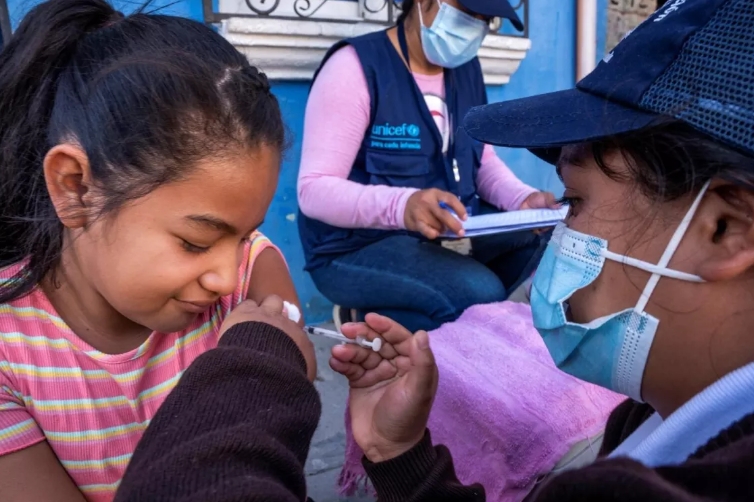We would like to thank you for choosing FridayParts and for choosing to be our customer in March,2022.
Based on 3814 orders in March, we donated $382 to poor children around the world. Each month, we donate to charity. Thank you for your support, FridayParts customers!
This month we want to share an article selected from UICEF-4 things you need to know about water and famine.
Conflict, climate change, poverty, and the COVID-19 pandemic have triggered a massive humanitarian crisis, which threatens millions of people with famine. The World Food Program warned in June 2021 that 41 million people in 43 countries were facing famine. Four countries, Ethiopia, Madagascar, South Sudan and Yemen, are already mired in famine-like conditions.
Water and sanitation are equally important to children and their families facing famine and food insecurity. There are four reasons for this:
- Disease and malnutrition
Sanitation and water can lead to malnutrition or exacerbate symptoms. As UNICEF’s Director of Emergency Assistance, Manuel Fontaine said, “No matter how much food a child suffering from malnutrition consumes, as long as their drinking water is not safe, their situation will not improve. “Unsafe water leads to diarrhoea, which deprives children of the nutrients they need to survive, ultimately resulting in malnutrition. A malnourished child is also more susceptible to waterborne diseases such as cholera. Almost half of the undernourished people around the world lack adequate access to water, hygiene, and sanitation.
- Climate change
Climate change and extreme weather events such as droughts and floods can deplete or pollute water resources. This threatens the quality and quantity of drinking water in entire communities. Families are forced to leave their homes due to water scarcity, increasing the risk of contracting diseases.
Globally, more than 1.42 billion people, including 450 million children, live in areas with high or extremely vulnerable water resources. In southern Madagascar, a prolonged drought is triggering a humanitarian crisis, including severe food insecurity, malnutrition and an increase in cases of water-borne diseases.
- Confliction
Climate change and extreme weather events such as droughts and floods can deplete or pollute water resources. This threatens the quality and quantity of drinking water in entire communities. Families are forced to leave their homes due to water scarcity, increasing the risk of contracting diseases.
- Become homeless
When war or drought force people out of their homes, children and their families are more vulnerable to abuse and health threats. Migrant children have no choice but to use unsafe water. Camps without toilets have also been hotspots for disease outbreaks. As a consequence, children who are already extremely vulnerable are more likely to catch diseases, and they are often left without hospitals and health care centers on their flights. There are 9.2 million displaced people in the four famine-stricken countries.
| September,2021 | October,2021 | November,2021 | December,2021 | January,2022 | February,2022 | March,2022 | |
|---|---|---|---|---|---|---|---|
| Amount raised by members (including GST) | $278.00 | $281.00 | $225.00 | $227.00 | $293.00 | $293.00 | $382.00 |
| Accumulated Orders (monthly) | 2780 | 2,678 | 2,242 | 2,153 | 2,930 | 2,889 | 3,814 |

Source:http://www.unicef.com







Leave A Comment